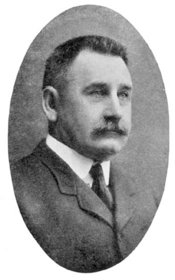Edward Tutwiler: Difference between revisions
| Line 19: | Line 19: | ||
==Tutwiler Coal, Coke and Iron Co== | ==Tutwiler Coal, Coke and Iron Co== | ||
Tutwiler founded the [[Tutwiler Coal, Coke and Iron Company]] in November [[1893]]. He acquired the newly-build [ | Tutwiler founded the [[Tutwiler Coal, Coke and Iron Company]] in November [[1893]]. He acquired the newly-build [[Vanderbilt Furnace]] in 1897, along with 36,000 acres of mineral properties, including 16,000 acres over the [[Pratt Coal Seam]]. which was incorporated into the [[Birmingham Coal and Iron Company]] in [[1906]]. | ||
He is interred at [[Oak Hill Cemetery]]. | He is interred at [[Oak Hill Cemetery]]. | ||
Revision as of 15:12, 16 April 2006
Major Edward Magruder Tutwiler (October 13, 1846- ) was a civil engineer working for the Georgia Pacific Railroad. He settled in Birmingham and became a mining engineer and developer. With John A. Montgomery he founded the city of Leeds east of Birmingham along the Georgia Pacific corridor.
Early life
Tutwiler was born at Palmyra in Fluvanna County, Virginia in 1846 to Colonel Thomas H. Tutwiler, a state legislator and Commonwealth's attorney. His great grandfather Shores took part in the American Revolution, and his grandfather, Martin, served under General Cockes in Virginia during the War of 1812.
Edward was a nephew of Henry Tutwiler, the Alabama educator, and cousin of Julia S. Tutwiler, the reformer.
After 6 years at the Palmyra school, Edward entered the Virginia Military Institute to study civil engineering. As a member of the VMI Corps of Cadets he fought in the Battle of Newmarket under General Breckinridge's orders. He served at the front until the end of the war and then returned to his studies, graduating in 1867.
In 1869, after working two years as a private tutor, Tutwiler took a job as a rodman for the Lehigh and Susquehanna Railroad. He progressed through various positions with different railroads and served for a time as assistant city engineer for Cincinnati, Ohio, before joining the Georgia Pacific and journeying to Alabama.
Georgia Pacific and Sloss
Tutwiler was assistant chief engineer of the Georgia Pacific Railroad and came to Birmingham in 1883 to supervise construction. With an address at the Relay House, Tutwiler was appointed superintendent of 13,000 acres of mineral land purchased by the Richmond and Danville Construction company, organized by John T. Milner in 1879, which was building the railroad. This property, developed by Milner, was connected to the new railroad and reorganized as the Coalburg Coal and Coke Company. Tutwiler oversaw development of new mines at Brookside, Blossburg, Cardiff, and Brazil. Contemporary accounts of "The Major" attest to his close and caring supervision. He lived in a cabin among the laborers (oftentimes convicts) at Coalburg and attended every meeting of the workers, trying to address their concerns and avoid unrest.
In 1887 Tutwiler was one of the directors of the North Birmingham Land Company that developed North Birmingham, which included a Georgia-Pacific railyard in addition to two Sloss blast furnaces.
He also oversaw the sale of the company to Sloss Iron and Steel Company in 1887 and worked for Sloss for two years as superintendent of mines. After resigning, he continued to operate the same mines under lease while accumulated property to found his own producer.
Tutwiler Coal, Coke and Iron Co
Tutwiler founded the Tutwiler Coal, Coke and Iron Company in November 1893. He acquired the newly-build Vanderbilt Furnace in 1897, along with 36,000 acres of mineral properties, including 16,000 acres over the Pratt Coal Seam. which was incorporated into the Birmingham Coal and Iron Company in 1906.
He is interred at Oak Hill Cemetery.
References
- Armes, Ethel (1910) The Story of Coal and Iron in Alabama. Birmingham: University Press
